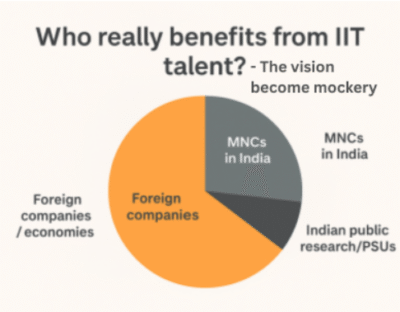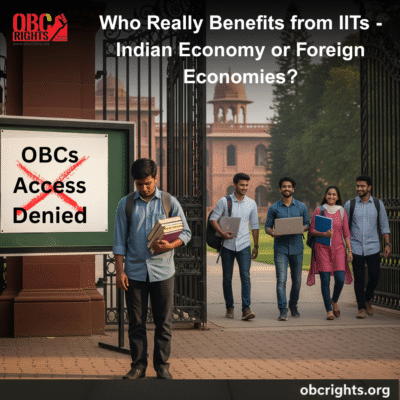Published – September 12, 2025
The Indian Institutes of Technology (IITs) were created with a noble vision: to supply the nation with engineers/technocrats who would drive industrial growth, strengthen research, and fuel nation-building. Decades later, IITs still hold global prestige—but the question remains: is India truly gaining from this investment, or are foreign economies the real beneficiaries, i.e., enjoying the fruits grown in Indian plants?
The Promise vs. the Reality
Each IIT seat is funded heavily by Indian taxpayers. Government spending per student runs into several lakhs, while student fees cover only a fraction. The expectation is that graduates should contribute to the nation’s progress.
But the career pathways tell a different story. A significant share of IIT graduates migrate abroad, while many who remain in India join multinational corporations rather than public research institutions. Only a small minority enter ISRO, DRDO, or public-sector industries—the very places where their expertise could directly strengthen national capabilities.

Who Gains from the Investment?
If India pays for the education of its brightest engineers, it should also gain from their work. But in reality, the outcomes frequently benefit other countries.
High salaries abroad: An IIT engineer in the US may earn ten times more than a scientist at ISRO.
Campus recruitment imbalance: Global tech giants hire aggressively from IITs, while Indian public institutions cannot match their offers.
Limited benefit to the public: The country funds their studies, but gets little value once they leave.
This raises the tough question—are IITs building India, or are they training talent for foreign economies?
Brain Drain or Global Connection?
It’s not entirely one-sided. The Indian diaspora does bring value through remittances, global networks, and collaborations. Some IIT alumni invest back in India or mentor startups here.
But for strategic areas like defence, space, renewable energy, or rural technology, India cannot depend only on goodwill. These sectors need IIT graduates to stay and contribute directly.
Social Justice and Equal Access
There’s also a fairness question: who gets into IITs?
Even today, backward classes and marginalized groups are underrepresented. A majority of seats still go to privileged groups, many of whom are more likely to migrate abroad. It means that government spending often supports those whose work does not strengthen India.
Expanding reservations for OBC, SC, and ST students, along with bridge courses, mentorship, and financial support, would make IITs more inclusive. It would also ensure that those who rise through the system are more likely to give back to India. The system of invoking “Not found Suitable (NFS)” must be eliminated from the selection process.
What Success Could Look Like
India should measure the real impact of IITs with clear indicators:
- Percentage of graduates joining national projects within five years.
- Smaller salary gaps between public research jobs and private offers.
- Better representation of marginalized communities in IITs.
- More patents, startups, and rural innovations coming from IIT labs.

Rethinking What We Celebrate
We often take pride when an IIT alumnus becomes the CEO of a global tech company. While this is impressive, it doesn’t always translate into progress for India.
If India funds the education, then India should also benefit from the outcomes—whether in research, innovation, or nation-building.
Turning Brain Drain into Nation Gain
IITs are a national treasure, but their benefits are still flowing unevenly. Taxpayers drain out their money, while global corporations often enjoy the returns. This imbalance must change.
But this change cannot come from policy alone—it also needs public pressure. As citizens, we must demand accountability from our leaders, push for reforms that retain talent, and support inclusive access to IITs.
India nurtures its best talent; now that talent must give back to the nation. Let’s ensure the IIT dream is not about fueling foreign economies, but about building a stronger, fairer nation. The choice is ours—will we let others reap the harvest, or will we claim our rightful share?



